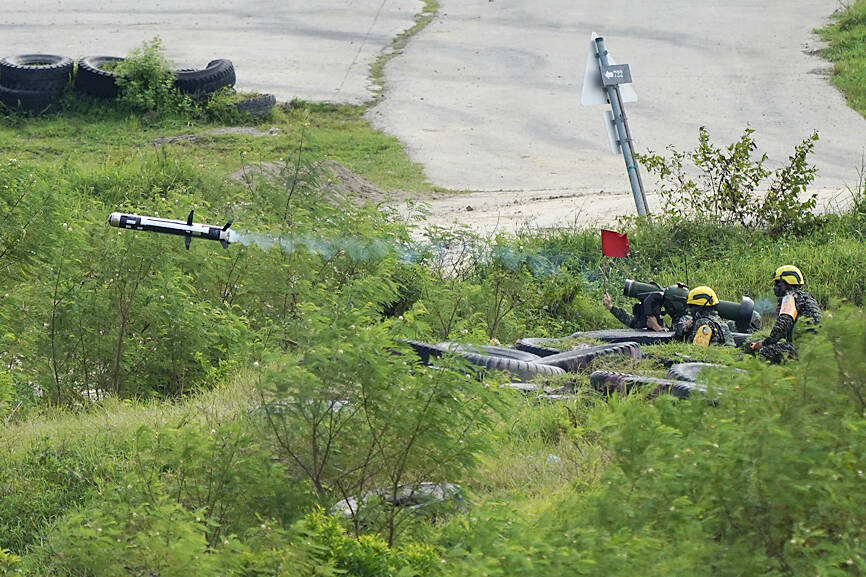The US has delivered 11 improved Phalanx close-in weapon systems and is to provide two more before the end of the year, while 400 Javelin anti-tank guided missiles are to be delivered before the end of next year, officials said yesterday.
The new Phalanx Block 1B systems are to be fitted in the navy’s warships during scheduled maintenance, which would significantly increase the fleet’s ability to survive enemy fire, a defense official said on condition of anonymity.
The navy’s eight older Phalanx systems are being upgraded in the US through an improvement program, which is scheduled for completion in 2025, they said.

Photo: CNA
The Phalanx systems are radar-directed guns that automatically engage anti-ship missiles and other threats to the ship, they said.
The Block 1B version of the system has a forward-looking infrared sensor, an improved 1.5km effective range and a firing rate of 4,500 rounds per minute, they said.
The new Phalanx systems are being fitted in Keelung-class destroyers and Kang Ding-class and Cheng Kung-class frigates, while the indigenous Tuo Chiang-class corvette and Yushan-class amphibious landing dock would also receive the upgraded systems, they said.
Taiwan took receipt of 42 command launch units of the US-made Javelin system, while 200 tube-and-missile assemblies are scheduled to arrive this year and another 200 assemblies next year, a defense official said yesterday.
The transfer of 400 Javelin missiles to Taiwan was originally announced by the administration of then-US president Donald Trump in July 2019, which included an additional 1,700 TOW 2B RF missiles, Institute of National Defense and Security Research director Su Tzu-yun (蘇紫雲) said.
The Javelin systems are fire-and-forget guided missiles that attack the topside of main battle tanks where the armor is thinnest, Su said, adding that the missiles are estimated to be able to penetrate 800mm of steel.
The Javelin systems would be lethal to amphibious craft that carry assault troops to beaches, and might prevent landing groups from reaching a shoreline, he said.
The TOW 2B RF missile — a longer-range weapon that requires a gunner to train sights on a target until the projectile strikes — has the advantage of being guided by radio waves rather than a wire, which proved vulnerable to contact with seawater during past exercises, he said.
The selection of these weapons for procurement suggests that the armed forces intend to use massed anti-tank missiles as short-range anti-ship weapons to counter the Chinese People’s Liberation Army Navy, Su said.
A battalion-seized amphibious assault unit requires up to 30 open-topped landing ships and lightly armored amphibious tanks, both of which are prime targets for Javelins and TOWs, he said.

A magnitude 5.6 earthquake struck off the coast of Yilan County at 12:37pm today, with clear shaking felt across much of northern Taiwan. There were no immediate reports of damage. The epicenter of the quake was 16.9km east-southeast of Yilan County Hall offshore at a depth of 66.8km, Central Weather Administration (CWA) data showed. The maximum intensity registered at a 4 in Yilan County’s Nanao Township (南澳) on Taiwan’s seven-tier scale. Other parts of Yilan, as well as certain areas of Hualien County, Taipei, New Taipei City, Taoyuan, Hsinchu County, Taichung and Miaoli County, recorded intensities of 3. Residents of Yilan County and Taipei received

Taiwan has secured another breakthrough in fruit exports, with jujubes, dragon fruit and lychees approved for shipment to the EU, the Ministry of Agriculture said yesterday. The Animal and Plant Health Inspection Agency on Thursday received formal notification of the approval from the EU, the ministry said, adding that the decision was expected to expand Taiwanese fruit producers’ access to high-end European markets. Taiwan exported 126 tonnes of lychees last year, valued at US$1.48 million, with Japan accounting for 102 tonnes. Other export destinations included New Zealand, Hong Kong, the US and Australia, ministry data showed. Jujube exports totaled 103 tonnes, valued at

BIG SPENDERS: Foreign investors bought the most Taiwan equities since 2005, signaling confidence that an AI boom would continue to benefit chipmakers Taiwan Semiconductor Manufacturing Co’s (TSMC, 台積電) market capitalization swelled to US$2 trillion for the first time following a 4.25 percent rally in its American depositary receipts (ADR) overnight, putting the world’s biggest contract chipmaker sixth on the list of the world’s biggest companies by market capitalization, just behind Amazon.com Inc. The site CompaniesMarketcap.com ranked TSMC ahead of Saudi Aramco and Meta Platforms Inc. The Taiwanese company’s ADRs on Tuesday surged to US$385.75 on the New York Stock Exchange, as strong demand for artificial intelligence (AI) applications led to chip supply constraints and boost revenue growth to record-breaking levels. Each TSMC ADR represents

TRUST: The KMT said it respected the US’ timing and considerations, and hoped it would continue to honor its commitments to helping Taiwan bolster its defenses and deterrence US President Donald Trump is delaying a multibillion-dollar arms sale to Taiwan to ensure his visit to Beijing is successful, a New York Times report said. The weapons sales package has stalled in the US Department of State, the report said, citing US officials it did not identify. The White House has told agencies not to push forward ahead of Trump’s meeting with Chinese President Xi Jinping (習近平), it said. The two last month held a phone call to discuss trade and geopolitical flashpoints ahead of the summit. Xi raised the Taiwan issue and urged the US to handle arms sales to